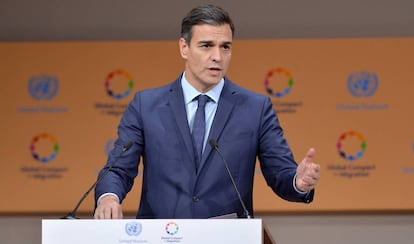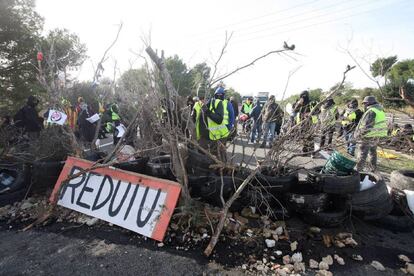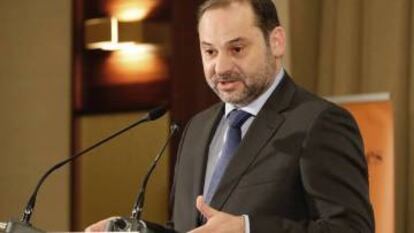Madrid will send police to Catalonia if public safety is not guaranteed
The warning comes ahead of a Cabinet meeting that PM Pedro Sánchez wants to hold in Barcelona

The Spanish government is adopting a tougher tone against Catalan separatists following a weekend in which pro-independence activists blocked a major road and tampered with toll barriers while the regional police force stood by and took no action.
The Spanish executive, led by Pedro Sánchez of the Socialist Party (PSOE), has sent three letters to Catalan authorities lamenting the “neglect of duty” on the part of the Mossos d’Esquadra, and warning that if the regional government does not guarantee public safety, the Interior Ministry will send in officers from the National Police force.
Security in Catalonia is fully guaranteed
Catalan Deputy Premier Pere Aragonés
The warning comes ahead of a Cabinet meeting that is due to be held on December 21 in Barcelona, rather than Madrid, as part of a government decision to take these weekly gatherings to other Spanish cities. The Sánchez executive wants to avoid scenes of chaos on that day, when pro-independence activists are expected to stage new public protests after cutting off the AP-7 highway for 15 hours on Saturday and lifting toll barriers on Sunday.
The prosecutor’s office in Catalonia has launched an investigation into alleged passivity by the Mossos d’Esquadra. Chief Attorney Francisco Bañeres said in a written statement that Mossos officers showed up on Saturday and Sunday, but that “their attitude was not oriented at dissuading the gathered crowds from their behavior, nor at using, had it been required, the necessary force in a proportional way to restore order in the face of illegal actions.”

Catalan premier Quim Torra, a hardline separatist, has failed to condemn these actions, and has instead targeted the Mossos for restraining violent protesters who were trying to break up a pro-Constitution rally in Girona on December 6. On Saturday, Torra also made a public defense of “the Slovenian way” as a model to follow on the road to Catalan independence. His words triggered broad condemnation from politicians, who noted that Slovenia went through a 10-day war that resulted in dozens of casualties.
Reducing the tension
On Tuesday, Catalan government spokeswoman Elsa Artadi struck a conciliatory tone, saying that the Spanish Cabinet meeting in Barcelona must be guaranteed. A week ago Artadi had described the meeting as “a provocation” and warned that the Catalan government would guarantee radical groups’ right to protest.

Also on Tuesday, the Socialist government confirmed that the Cabinet meeting will go ahead in Barcelona despite public doubts expressed by Public Works Minister José Luis Ábalos, who said earlier that “we need to assess whether the things that are done with a good intention will achieve a positive result; what the government should always do is to preserve social harmony.”
The minister noted that he was speaking on a personal note, and Deputy Prime Minister Carmen Calvo reasserted that the meeting will be held as planned. “This is so and it is not going to be changed in any way.”
Setback in Andalusia
Besides this escalation of rhetoric and activism in Catalonia, the Sánchez administration is also dealing with the fallout of the recent election in Andalusia, where the PSOE has been in power for the last 36 years. The rise of a far-right party called Vox, which garnered an unprecedented 12 seats in the regional assembly on a platform that includes strong opposition to the Catalan secessionist drive, could lead to a center-right government that would end the PSOE’s 36-year grip on Spain’s second-largest region. The Andalusian election is also viewed by many as a harbinger of things to come as Spain prepares for local, regional and European elections next year.
Three letters
Deputy Prime Minister Carmen Calvo has sent a letter to her Catalan counterpart, Pere Aragonés, stating that “apparently there has been a neglect of duties that fall to your government, with consequences for public safety. […] It is our obligation to assess where there has been any non-compliance with the law.”
Public Works Minister José Luis Ábalos sent a letter of his own, and there was a third by Interior Minister Fernando Grande-Marlaska. It is this latter one that strikes the hardest tone, citing the law that would allow Madrid to send in the National Police if the Mossos d’Esquadra do not guarantee public safety.
Against this backdrop, Sánchez has decided to up the ante and send a warning to the Catalan government despite his own weak position in Congress, where the PSOE leads a minority government that is struggling to secure approval for the 2019 budget.
Sánchez, who gained power in early June after leading a successful no-confidence vote against Mariano Rajoy of the Popular Party (PP), needs the backing of Catalan pro-independence parties in Congress to get legislation passed, and if support for the budget is not forthcoming Spain could face a snap election.
The return of Article 155?
The PSOE government underscored that sending in national police would not mean a renewed application of Article 155 of the Spanish Constitution, which the previous PP administration invoked after the Catalan government held an unauthorized referendum on independence on October 1, before voting a unilateral declaration of independence through the Catalan parliament. Madrid used this constitutional provision to suspend the region’s autonomous powers for seven months, until new elections were held in Catalonia.
Government sources said that for now there are no plans to reintroduce Article 155, or to take over control of the Mossos police force. But there will be a large contingent of National Police and Civil Guard officers on duty in Barcelona on December 21, a sign that Madrid does not trust the Catalan police to act against public disturbances by pro-independence activists.
On Monday evening, Catalonia’s deputy premier, Pere Aragonés, said on national television that “security in Catalonia is fully guaranteed” and that the Mossos “always act with professional, not political criteria.” This force was criticized by Spanish authorities last year for failing to act against the unauthorized independence referendum of October 1. Last week it was criticized by separatist politicians for “assaulting anti-fascists” at the December 6 rally in Girona.
English version by Susana Urra.
Tu suscripción se está usando en otro dispositivo
¿Quieres añadir otro usuario a tu suscripción?
Si continúas leyendo en este dispositivo, no se podrá leer en el otro.
FlechaTu suscripción se está usando en otro dispositivo y solo puedes acceder a EL PAÍS desde un dispositivo a la vez.
Si quieres compartir tu cuenta, cambia tu suscripción a la modalidad Premium, así podrás añadir otro usuario. Cada uno accederá con su propia cuenta de email, lo que os permitirá personalizar vuestra experiencia en EL PAÍS.
¿Tienes una suscripción de empresa? Accede aquí para contratar más cuentas.
En el caso de no saber quién está usando tu cuenta, te recomendamos cambiar tu contraseña aquí.
Si decides continuar compartiendo tu cuenta, este mensaje se mostrará en tu dispositivo y en el de la otra persona que está usando tu cuenta de forma indefinida, afectando a tu experiencia de lectura. Puedes consultar aquí los términos y condiciones de la suscripción digital.








































